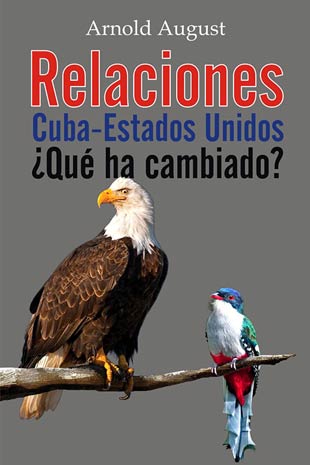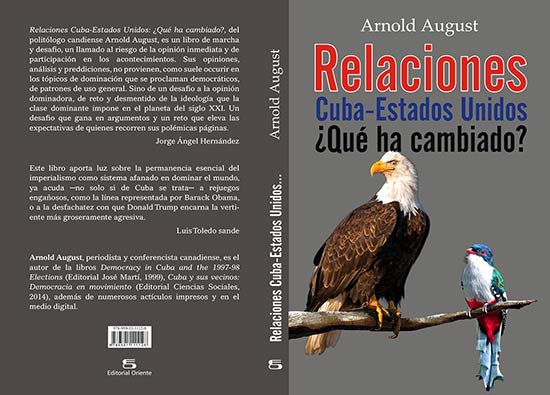
Click here to see the full book cover.

Click here to enlarge the book cover.

Contact Arnold via the form on his main website
Subscribe to Arnold’s Geopolitics Newsletter via his main website
Universidad de La Habana
Ni tantito así…
Por Raúl Escalona Abella, estudiante de tercer año de Periodismo, Universidad de La Habana.
 Raúl Escalona Abella
Raúl Escalona Abella27 de septiembre, 2018.
Empezar esta nota diciendo que fue presentado un libro sobre las relaciones Cuba - Estados Unidos podría parecer tedioso, e incluso podríamos leer el pensamiento del lector y figurar en su mente frases como: “otra vez lo mismo”, “que sí, que lo americanos son malos, ya los sabemos”. Pero este comentarista está convencido de que las mentes que viajaron esta mañana en la presentación del texto “Relaciones Cuba – Estados Unidos, ¿Qué ha cambiado?” de Arnold August, emergieron iluminadas, permeadas de una nueva perspectiva, rociadas de una nueva esperanza.
Fue así: el autor canadiense eligió nuestra facultad para presentar su libro; cuaderno que ahonda en un análisis actual y pormenorizado de las complejas dinámicas que persisten entre los dos países y dedica un acápite, entre otros, a la comprensión de lo que es libertad de prensa y al desarrollo de este concepto en ambas realidades. Si bien interesante presume ser el libro, cautivante fue el espacio de intercambio que se desató donde intervinieron profesores nacionales y foráneos y noveles feconianos que también se aventuraron a preguntar.
La invitación a la lectura quedó signada cuando el profesor norteamericano Charles McKelvey definió en su exposición que el pueblo cubano tenía en su poder la fuerza aún viva y constante de la revolución verdadera. En caminos tan trillados, donde la apología oficialista asesina sin piedad la naturaleza vivificante del sentimiento, solo la visión de un foráneo nos puede devolver la esperanza de construir el socialismo verdadero, en el que la masa palpita y transforma.
Más allá de la teoría y de la correcta elaboración del libro, quien escribe peca en recomendar su lectura sin haberlo hecho él previamente, pero lo hace consciente de que de esas páginas va a emerger una arista nueva de un problema que ya nos cansa su debate y nos frustra su mención, pero del que estoy convencido de que si obviamos, daría al traste con la Revolución, y no con la figura anquilosada que como quimera ridícula se sienta en nuestras cabezas, sino con la verdadera y única, las que necesitan los obreros, los campesinos, la que habita en el corazón lloroso de tanta tristeza. Esa es la que hay que seguir haciendo, por encima de deficiencias y dogmatismos, y en medio de esta vorágine creativa tener bien claro la imagen del Che, que como paladín de la lucidez nos avisaba, tal y como nuestros compañeros foráneos hoy: “al imperialismo no le podemos dar ni tantito así… nada”.
“…NOT ONE BIT”
By Raúl Escalona Abella, third-year journalism student, Faculty of Communication (Journalism), University of Havana.
Published in the Faculty of Communication (journalism), University of Havana web site, September 27, 2018.
It might seem tedious to begin this article by stating that it concerns the launch of a book about Cuba-U.S. relations; one can almost guess what will be going on in the reader’s mind, and that he or she will be thinking, “Here we go again… I know, the Americans are the bad guys, what else is new?” But this commentator is convinced that the keen minds who made a point of attending the launch of Relaciones Cuba – Estados Unidos, ¿Qué ha cambiado? [the Cuban Spanish-language edition of Cuba-U.S. Relations: Obama and Beyond] by Canadian author Arnold August came away enlightened, enriched with a new outlook, touched with new hope.
For that is what occurred: August chose the Faculty of Communication as the venue for the launch of his new book, a detailed, in-depth, up-to-date analysis of the complex dynamics persisting between the two countries. Most relevantly for our purposes, he devotes a section of the book to a discussion of freedom of the press and how it manifests itself in each of the two national contexts. While the book certainly promises to be interesting, the discussion around its launch proved captivating, with Cuban and international professors commenting on the topic and students at the faculty chiming in with questions.
The invitation to read this book was laid down when U.S.-born professor Charles McKelvey stated in his remarks that the Cuban people have in their possession the constant, ever-vibrant force of the true Revolution. On such well-worn paths, where party-line apologetics mercilessly snuff out the exhilarating essence of genuine sentiment, only an outsider’s vision can restore to us the hope of building true socialism, in which the beating heart of the evolving masses resides.
While I can say that the book is clearly soundly constructed and grounded in theory, I must confess that enthusiasm precedes reading in my case, and that if I recommend it nonetheless, it is with the certainty that it will give us a new look at an oft-debated problem, albeit one whose reappearance here may cause some eyes to roll. For I remain convinced that to dodge this issue is to risk scuttling the Revolution; and by that word I don’t mean the old sclerotic trope, the absurd chimera taking up valuable space in our heads. No, I refer to the one true Revolution, the one needed by the workers and peasants, the one that dwells in hearts bursting with tears of sorrow. That is the Revolution we must continue to make, overcoming deficiencies and questioning dogmas along the way. And as we stay the course through this whirlwind of creation, let us keep focused on the image of Che, that paladin of lucidity, who counseled us, as our international comrades do now: “Never let down your guard against imperialism – not one bit.”
Original in Spanish: http://www.fcom.uh.cu/ni-tantito-asi
Fotos: El grupo de comunicación de la Facultad de Comunicación, Universidad de La Habana.
Fotos: Liset García, periodista Bohemia.
For photos and reports of other book events of the same Tour, click here
For photo and comments of the North America Tour, click here
For photo and comments of the United Kingdom Tour, click here



























